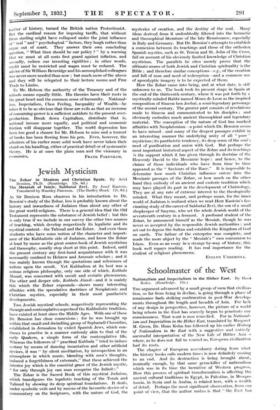Jewish Mysticism
The Zohar in Moslem and Christian Spain. By Ariel Bension, Ph.D. (Routledge. 12e. 6d..) As Sir Denison Ross observes in his introduction to Dr. Bension's study of the Zohar, less is probably known about the
history and inwardness of Judaism than about any other of the great world-religions. There is a general idea that the Old Testament represents the substance of Jewish belief : but this is only true if we include in our survey the other two sources of teaching, which develop respectively its legalistic and its mystical content—the Talmud and the Zohar. And even those students who have some notion of the character and import- ance of the Kabbalistic side of Judaism, and know the Zohar at least by name as the great source-book of Jewish mysticism and theosophy, usually stop short at this point. Indeed, until the present century any first-hand acquaintance with it was necessarily confined to Hebrew and Aramaic scholars ; and it was mainly known through the quotations and references of
writers upon the occult. Yet Kabbalism at its best was a serious religious philosophy, only one side of which, Kabbala Maasit, was concerned with occult and ecstatic phenomena. The other and deeper side, Kabbala Jiunit—and it is mainly this which the Zohar expounds—shows many interesting affinities with the speculative doctrines of Neoplatonic and Christian mystics, especially in their most pantheist;c
developments.
Two Jewish mystical schools, respectively representing the theurgic and contemplative aspects of the Kabbalistic tradition, have existed at least since the Middle Ages. With one of these Dr. Bension has close connexions ; for he was brought up within that small and dwindling group of Sepharadi Chassidim, established in Jerusalem by exiled Spanish Jews, which con- tinues to practise in a manner curiously akin to that of the early Quakers, a simple form of the contemplative life- Whereas the followers of " practical Kabbala " tried to induce ecstasy by means of dancing incantation and other artificial devices, it was " by silent meditation, by introspection in an atmosphere in which music, blending with men's thoughts, induced a forgetfulness of externals," that these achieved the interior joy which is the essential grace of the Jewish mystic, " for only through Joy can man recognize the Infinit::."
The Zohar is the Sacred Book of this mystical Judaism, whieh transfigures the legalistic teaching of the Torah and Talmud by showing its deep spiritual foundations. It deals, under symbolic veils and by means of the favourite device of a commentary on the Scriptures, with the nature of God, the mysteries of creation, and the destiny of the soul. Many ideas derived from it undoubtedly filtered into the hermetic and theosophical literature of the late Renaissance, especially in Italy and Germany. But Dr. Bension's attempts to establish a connexion between its teachings and those of the orthodox Spanish mystics, such as St. Teresa and St. John of the Cross, fail on account of his obviously limited knowledge of Christian mysticism. The parallels he cites merely prove that the ultimate source of both Jewish and Christian spirituality is the Bible ; and therefore similar conceptions--e.g., of the creation and fall of man and need of redemption—and a common use of apocalyptic imagery is to be expected of them.
How the Zohar came into being, and at what date, is still unknown to us. The book took its present shape in Spain at the end of the thirteenth century, where it was put forth by a mystically minded Rabbi named Moses de Leon as the inspired composition of Simeon ben Joehai, a semi-legendary personage of the second century. The greater part consists of revelations made to Simeon and communicated to his disciples ; and obviously embodies much ancient theosophical and legendary material. The conception of the nature of God has marked affinities with Neoplatonism—a point which Dr. Bension seems to have missed-7-and many of the deepest passages exhibit in an interesting manner the underlying unity of all " pure " mysticism; its pantheistic tendency, its deep sense of the soul's need of purification and union with God. But perhaps the most important historical aspect of the Zohar and its teachings is the support which it has given through its doctrine of the Heavenly David to the Messianic hope : and hence, to the claims of those individuals who have from time to time appeared as the " Saviours of the Race." It is impossible to determine how much Christian influence enters into the Messianic passages of the Zohar, or how much on the other hand they embody of an ancient and esoteric tradition which May have played its part in the development of Christology. They are at any rate of extreme interest to the theologically minded. What they meant, and perhaps mean, for the inner world of Judaism is realized when we read Herr Kastein's fas- cinating study of the career of Sabbatai Zevi, the son of a small shopkeeper of Smyrna, who set the whole Jewish world of the seventeenth century in a ferment. A profound student of the Zoluti, he announced himself as the Messiah, though he was never so accepted by the responsible Jewish authorities ; and set out to depose the Sultan and establish the Kingdom of God on earth. The failure of the enterprise was complete, and made the more abject by the " Messiah's " own conversion to Islam. Even as an essay in a strange by-way of history, this book well repays reading. It has real importance for the Student of religioui phenomena.
EVELYN UNDERIH LL






























 Previous page
Previous page